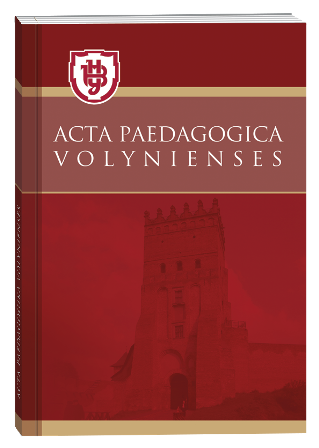КОМПЕТЕНТНІСНА МОДЕЛЬ ФОРМУВАННЯ ЧАСОВИХ УЯВЛЕНЬ У ЗДОБУВАЧІВ ПОЧАТКОВОЇ ОСВІТИ НА УРОКАХ МАТЕМАТИКИ
DOI:
https://doi.org/10.32782/apv/2023.4.7Ключові слова:
математична компетентність, здобувач початкової освіти, величини, часові уявлення, урок математики в початкових класахАнотація
У статті теоретично обґрунтовано та розкрито проблему формування часових уявлень у здобувачів початкової освіти на уроках математики. Охарактеризовано відповідні змістові лінії «Числа, дії з числами. Величини» та «Вимірювання величин» математичної освітньої галузі у Типових освітніх програмах початкової освіти; розглянуто очікувані результати навчання здобувачів освіти в межах змістових ліній. Проаналізовано програмовий зміст математичної освітньої галузі, виділено порядок введення одиниць вимірювання часу за роками навчання. На основі аналізу вимог Державного стандарту початкової освіти, Типових освітніх програм, чинних підручників з математики для початкових класів визначено основні завдання формування часових уявлень у здобувачів початкової освіти. На прикладі формування часових уявлень учнів проілюстровано компетентнісну модель навчання, яка передбачає таку систему завдань: завдання на дослідження та визначення математичної проблеми; завдання на моделювання стратегій для розв’язання математичної проблеми; завдання на критичне оцінювання даних, процесу та результату розв’язання (аналітичні, аналітико-синтетичні, контрольно-корекційні завдання); завдання на застосування досвіду математичної діяльності для пізнання навколишнього світу. Головне завдання компетентнісної моделі навчання математики в початкових класах ‒ створення умов опанування учнями вміннями визначати спосіб вирішення математичного завдання, обґрунтовувати вибір дій для вирішення завдання за зразком, інструкцією, що забезпечує самостійну діяльність учнів та сприяє формуванню їх пізнавальної активності. Запропоновано систему завдань і вправ для реалізації компетентнісної моделі формування часових уявлень у здобувачів початкової освіти на уроках математики в 4 класі.
Посилання
Авраменко К. Б. Методика вивчення величин та дробів у початковій школі : навчально-методичний посібник. Миколаїв : СПД Румянцева, 2020. 78 с.
Листопад Н. П. Вивчення величин на уроках математики в початковій школі на засадах компетентнісного підходу / [Електронне видання] : методичні рекомендації. Київ : Педагогічна думка, 2020. 72 с.
Онопрієнко О., Листопад Н., Скворцова С. Компетентнісний підхід до навчання математики. Київ : Редакції газет з дошкільної та початкової освіти, 2014. 128 с.
Про затвердження Державного стандарту початкової освіти : Постанова Кабінету Міністрів України від 21 лютого 2018 р. № 87 (у редакції постанови Кабінету Міністрів України від 30 вересня 2020 р. № 898). URL : https://zakon.rada.gov.ua/laws/show/87-2018-%D0%BF
Романенко Ю., Лещенко В., Шкарбан Л. Рекомендації щодо формування математичної компетентності учнів на рівні початкової освіти / за ред. О. Осадчої та Ю. Романенко. Український центр оцінювання якості освіти. Київ, 2022. 43 с.
Типова освітня програма, розроблена під керівництвом Савченко О. Я. 1–2 клас. Наказ Міністерства освіти і науки України від 12.08.2022 № 743-22.
Типова освітня програма, розроблена під керівництвом Савченко О. Я. 3–4 клас. Наказ Міністерства освіти і науки України від 12.08.2022 № 743-22.
Типова освітня програма, розроблена під керівництвом Шияна Р. Б. 1-2 клас. Наказ Міністерства освіти і науки України від 12.08.2022 № 743-22.
Типова освітня програма, розроблена під керівництвом Шияна Р. Б. 3-4 клас. Наказ Міністерства освіти і науки України від 12.08.2022 № 743-22.







